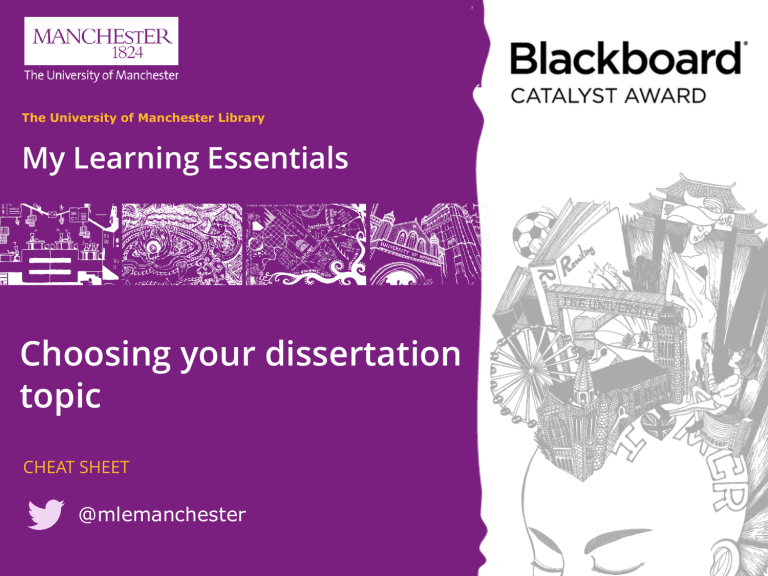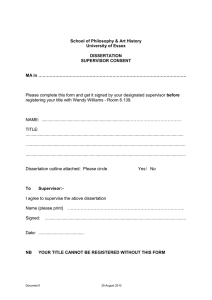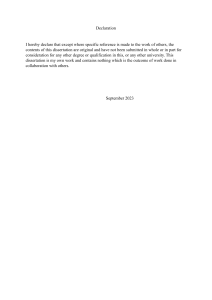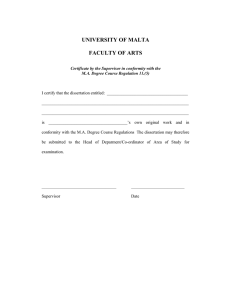
The University of Manchester Library My Learning Essentials Choosing your dissertation topic CHEAT SHEET @mlemanchester Introduction Undertaking a dissertation is unlike any other piece of academic work you will have done so far. It’s different because it offers you the opportunity to develop your intellectual independence while specialising in depth in a topic of interest. It can involve many stages, the first of which is usually choosing your topic and deciding on your research question. It will enable you to write a first draft title for your dissertation and produce the objectives to achieve your research questions. Generating ideas: questions When thinking of a possible topic for your dissertation it can be hard to know where to start. Spending time choosing the right topic and research question is a very important part of the dissertation process. To get you started, why not think about the following questions: What have you covered on your course so far? What topics were of interest to you? Has anyone done something similar before? Is your topic relevant to research/practice/theory in your field? What is already known or understood about the topic? What questions do you feel have not been answered on topics so far? What are your career ideas after completing your degree? Are there any new or developing areas in your subject? Is there anything you disagree with? In the next section we will look at Mind maps. Generating ideas: mind maps Mind maps and pattern notes allow you to see an overview of your topic. Mind maps can be used to identify connections between ideas and details. Using colour coding in your Mind maps can help to group emerging themes together. Check out mind mapping software such as Freeplane, MindGenius and Inspiration. Generating ideas: ideas grid Another way to break down possible topics is to look at the important factors and see if there is any overlap in topics. Why not try filling out the grid on the right and see what you come up with? This is only looking at two aspects, you could add another box to the right or underneath if you feel you need to reduce your list further. Conducting preliminary research Before deciding on a topic it is essential to investigate what research already exists. This can prevent problems further the down the line. This initial searching exercise should enable you to see: • Is there enough research on your topic? • Is the scope of your topic realistic? • Has your question already been answered? Before undertaking your search you may find it beneficial to look at the resource below: Planning ahead: making your search work This resource will help you plan an effective search strategy, review your results and adjust your strategy for future searches. In the next section we will look at the sources you can use to carry out your initial search. Conducting preliminary research – student tip Identify possible areas of research by understanding what already exists and working with your supervisor. “Once I had picked my broad area I was assigned a supervisor. She suggested some things to read to help me to focus my research.” “This background reading helped me to understand what had already been written in my subject area and identify possible areas for me to focus on.” Library Search: Are there enough sources? It is also important to find out if there are enough sources of related research for you to draw on. Library Search is a search tool that you can use to search the Library’s electronic and physical resources, such as books, e-books, journal articles, manuscripts and images. It provides a good starting point for your research, especially when trying to find out if there is enough related research for you to make reference to in your own dissertation. Subject Guides: Are there enough sources? It is also important to find out if there are enough sources of related research for you to draw on. Subject Guides contain useful information and details of recommended resources to support your studies such as: • Subject databases • Journals • Reading lists Databases: Are there enough sources? It is also important to find out if there are enough sources of related research for you to draw on. Library databases give us access to information. Some organise information about academic journals to make it easier to find what you need. Others might contain statistics, newspaper articles or specialist reports focusing on particular industries. Databases A-Z Your Subject Guide provides a list of databases useful in your subject area. For more information on all these sources of information you may want to look at the resource: Knowing where to look: your search toolkit Your supervisor As part of your dissertation you will be appointed a dissertation supervisor. Your supervisor is there to provide ongoing guidance. This will usually include advice and feedback on: framing your research question building on theories and appropriate methodology the quality of your work and how you can improve it structuring your dissertation problems you have encountered For an effective working relationship with your supervisor follow these tips: Meet regularly and take notes. Discuss your potential reading, methodology and/or research data and its relevance for the topic you have chosen. Email or bring hard-copies of draft chapters or sections for your supervisor to look over and comment on any issues that may need addressing. Remember your supervisor is not expected to edit your work or provide feedback highlighting misprints , name corrections, typos, poor English etc. Your research question Once you've chosen a dissertation topic its time to start thinking about your research question. Your question is not the same as your topic. It needs to be phrased so that it asks something specific and focused. It is important, as it will shape the whole of your dissertation going forward. Your question should help you communicate the problem or gap your dissertation will address. Other components of your dissertation including your literature review and methodology will progress from your research question. Before settling on a question you may want to ask yourself: "Will it keep me interested?“ "Can I answer it with the time and resources I have?“ "Is there someone who can supervise me?“ "Do I have an idea of how I may go about answering it?“ “Is it theoretical or empirical?” Your research question – student tip “It is important that your chosen research question is clearly focused and well written; answering it must be achievable in the time available to you!” How can you refine your research question? There are many ways to narrow down your question into something more specific. Try working through the following questions. They are also available in the downloads section of this resource. What topic have you chosen? What interests you about this topic? What is your broad question? What is your particular area of interest? Are you focusing on a specific time period? If so, when? Is the focus on a particular geographical area? If so, where? What influencing factors are involved in this topic? What elements of the topic specifically would you like to research further? What is your precise question? Remember there is time to further refine or develop your question as needed; it is not set in stone. In the next section we will look at setting your objectives for how you will achieve an answer to your research question. Refining your research question – student tip Decide what research questions you would like to answer and set your objectives for how you will achieve them. “Having decided upon the focus of my research, I knew I needed to state what I intended on doing as questions which my research would look to answer.” “By speaking to my supervisor I was able to create objectives which described what I wanted to achieve with my research and which were realistic!” How can you set objectives? So you now have a research question, but how will you go about answering it? You may already have some ideas, but it is essential you write some clear objectives. Writing your objectives will give you an idea of the work involved in your research topic and whether it is manageable. Here are some of the things you may want to consider when writing your objectives: How you are going to approach the research required to answer your question, i.e. what will be your methodology? Will you be examining secondary evidence (data sets, census reports, films etc) or collecting your own primary research data (e.g. through interviews)? Does this way of working play to your strengths? What resources will you need? Take a look at the Academic Phrasebank for some advice on phrasing your objectives. Academic Phrasebank Setting objectives – student tip Your research question and the objectives to achieve it. “It is important that your chosen research question is clearly focused and well written; answering it must be achievable in the time available to you!” Your research title Your dissertation title is important as it tells your reader what your dissertation is about! Titles often highlight the purpose and context of your research as well as any parameters you are working within. At this stage your title is just a working draft and can be changed as the direction of your research becomes clearer. However having a clear and well-written title can help you to focus going forward. Each word of your title is significant and it is essentials to analyse them and ask yourself what they add. Try to use each word to express something meaningful about what your research includes. In the next section we will look at some of the things you may want to include in your title. Your research title The following pointers are a useful start to creating a relevant and well-written title for your dissertation. Think about those things that are most appropriate for your research and convey what your reader can expect to find in your dissertation. Some examples of past dissertation titles may be available on your school’s intranet page or Blackboard/ VLE space; speak to your school or supervisor to find out. Your research title – student tip Create a title which describes and is representative of your research. “My supervisor asked me to send her a short sentence describing my research, which I used as a ‘working title’ for my dissertation. This helped me to remain focused on the objectives of my research.” “As I carried out my research and new avenues of enquiry opened up, I found that my title changed a little. I was comfortable with letting my research help form the title of my dissertation and ended up with a title which described my dissertation well.” Summary In this resource we have looked at the key elements of your dissertation: Choosing a topic Writing a research question(s) Setting objectives to achieve an answer to your research question Working with your supervisor You should now be able to start researching areas and topics of interest. Remember, your title and even your topic may change early in the process. Allow time in your planning for changes: your title can change throughout the process depending on the direction your research takes you. It is usually OK to have a draft title until submission, however you will need to check this with your school. Keep in touch! mle@manchester.ac.uk @mlemanchester Related resources Start to finish: Dissertations Dissertations: Planning Dissertations: The A to Z of literature reviews Planning ahead: making your search work


